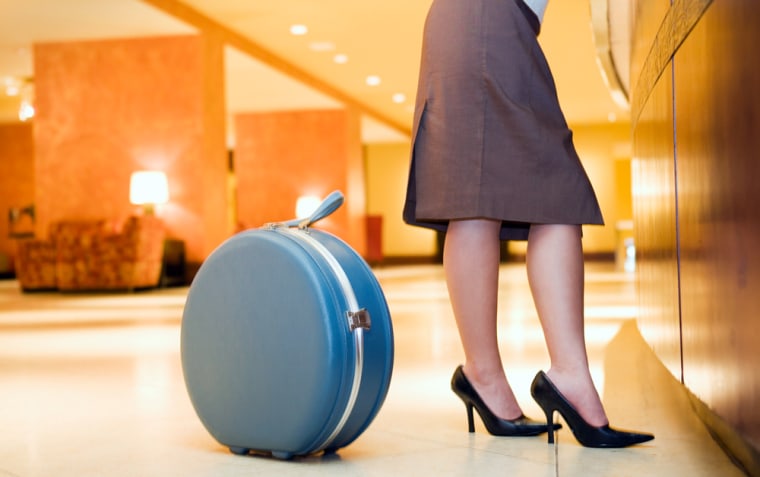Your next hotel might not be a hotel. It could be a condo. Or a rental apartment. Or a home.
And maybe it should be.
It isn’t just that many travelers are turned off by traditional hotels, inns and resorts. I admit, there are plenty of reasons to check out of the lodge these days, from through-the-roof room rates to being nickeled-and-dimed for every little extra item. It’s that the alternatives are often roomier, less expensive and more convenient.
No one is predicting the demise of the hotel industry here. Not by a long shot. But what I am saying that when it comes to overnight accommodations on your next trip, you might consider an alternate to a traditional hotel.
Here are five reasons why:
Lots and lots of room
Renting a house or condo almost always gives you more room for less money. That’s the experience of travelers like Linda Frappia, a health care manager from Irvine, Calif. She has rented homes in Europe with two bedrooms and kitchens for as low as $500 a week during off-season. That’s about as much as it costs for a comparable suite in a nice hotel — for one night. “I was pleasantly surprised at how charming the accommodations were as well,” she told me. In France, for example, she rented a 200-year-old house that had been completely remodeled. “It was actually nicer than the pictures on the Internet,” she adds.
More privacy
Hotels are, by their very nature, public places, from the lobby to the exercise rooms. If you want to go somewhere where you don’t have to rub shoulders with the masses, you’ll want to skip the hotel. Rosanne Skopp did. She’s a retired real estate broker from West Orange, N.J., who had spent one night too many at a bed-and-breakfast. “It was too cozy. When we return from a long day of sightseeing, we long for privacy and peace and don’t want to chitchat with an overly friendly bed-and-breakfast owner,” she says. The solution was to rent an apartment, which means, “comfort without intrusion.”
A better price
Hotels are expensive. Even cheap hotels can be pricey, once you factor in taxes, “resort” fees and other surcharges. But that’s not necessarily the case with one of the popular hotel alternatives. Lyn Clarke, a retired nurse from Fairview Heights, Ill., finds that the rental apartments she and her husband, John, prefer when they travel to Europe don’t only cost less. They also allow her to save money in other ways, too. “We can enjoy our own home-cooked food,” she says. “When we travel internationally, we always look for apartments, and we generally homestead in one place for a week at a time. It’s more cost-effective.”
You can go native
Most hotels are built in resort areas, and it’s difficult to get a feel for what a place is really like when you’re miles away from any residents. But rent a condo, home or apartment, and you’re more likely to be right in the middle of everything. “It gets us out of the insular resorts and into the local community a bit more,” says Dean Starovasnik, a director for an engineering firm in Norcross, Ga. “Isn’t that part of the objective of travel — to experience environments outside our normal comfort zone?”
Extra flexibility
Hotels have rules. Some of them are very strict. For example, say you want to take the whole family — including grandma and grandpa — on your next vacation. Don’t try squeezing everyone into a hotel room, or even a suite. But rent a home or an apartment, and no one is likely to tell you to cap the number of guests, or threaten you with a surcharge if there are too many people in the place. That’s what travelers like Dave Sturtz, who works for an overnight delivery company in Boulder, Colo., likes about today’s lodging alternatives. He’s rented homes directly from owners in places like Maui, St. Croix and Belize, and takes anywhere from four to six people along — something he could never do in one hotel room. “I’ve had good luck renting houses and condos,” he says.
Reality check: this is not for everyone.
Some travelers will still be more comfortable in a traditional hotel. For example, business travelers who are in town for just a few days will probably want to stay away from a condo or a home exchange. It’s not worth it for them. Darryl Cohen, an attorney in Atlanta, explains his preference for hotels as follows: “I’m well taken care of, and if there is a problem, a staff member is available to remedy the situation.”
But the longer I watch these non-hotel alternatives develop, the more convinced I am that they represent the future of lodging. Just ask someone like Lois Sealey, who runs a site called Home Base Holidays, and you’re left with the impression that at a time when lodging prices are at or near record highs, these options offer an attractive way around the headaches of staying at a hotel. “They’re more convenient, offer you more freedom and space,” she says.
In other words, for a lot of travelers, staying at the inn is out.
Every Monday, my column takes a close look at what makes the travel business tick. are always welcome, and if you can’t get enough of my column, for daily insights into the world of travel.
